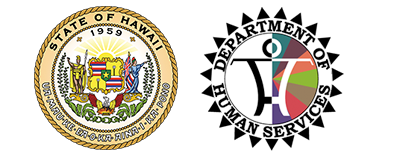Health & Safety Training
Health & Safety Training Guide for DHS Licensed and Registered Child Care Providers and License-Exempt Child Care Providers used by Child Care Subsidy Clients
On November 19, 2014, Congress passed and President Obama signed the Child Care Development Block Grant (CCDBG) Act of 2014, Public Law (P.L.) 113-186, which reauthorizes the Child Care Development Fund (CCDF) grant. The CCDBG Act requires states to establish minimum standards for health and safety requirements for regulated and exempt providers caring for children whose family receives a subsidy from the Department of Human Services (DHS).
The Department of Human Services (DHS) has adopted rules for licensed and registered child care providers, exempt child care providers and child care payments, Chapters 17-892.2, 17-895.1, 17-896.1, 17-891.2, 17-800 and 17-798.3, Hawaii Administrative Rules (HAR), to implement health and safety requirements, which includes training for child care providers. In order to satisfy the initial training requirements, all licensed and registered child care providers and exempt child care providers must review the “Basic Health and Safety Practices: Child Care Provider’s Guide”, “Health and Safety Practices Addendum“, and complete an Assessment as part of the regulatory requirements and requirements for families to continue to receive a child care subsidy from DHS and use their current exempt provider.
The Department has the Basic Health and Safety Guide translated versions available for viewing and printing copies
On-Going Annual Health & Safety Training
Once the initial training requirements are meet by all licensed and registered child care providers and exempt child care providers, providers shall demonstrate and provide written evidence to show completion of training within one year of completion of initial training and annually thereafter.
Licensed and Registered Providers
Licensed and Registered provider shall complete a least sixteen (16) hours of training in at least two (2) topic areas.
Substitutes shall complete at least ten (10) hours of training in at least two (2) topic areas.
Volunteers who serve ten (10) hours or more a week shall complete at least eight (8) hours of training in at least two (2) topic areas.
Exempt Providers
Exempt Center-Based providers and Exempt Home-Based providers shall complete at least eight (8) hours training in at least two (2) topic areas.
Topic Areas
- Physical care of the young child;
- Care of the sick child;
- Nutrition;
- Child Growth and development;
- Children with special needs;
- Learning activities and play;
- Family engagement;
- Managing challenging behaviors;
- Community resources;
- Prevention of child maltreatment and abuse;
- Pediatric firs aid and child cardiopulmonary resuscitation;
- Health and safety;
- Child care business or program management;
- Physical environment; or
- Safe sleep, if permitted to care for children less than one (1) year of age.
Annual Training Cover Sheet
To receive credit for an-going training, please complete the annual training cover sheet and submit it with all your documents. Licensed and Registered providers submit documents to People Attentive to Children (PATCH). Exempt Center-Based providers and Exempt Home-Based providers submit documents to Learning to Grow (LTG).
Cover sheet to submit to PATCH
Mail the cover sheet and training certificate to:
PATCH
ATTN: DHS Early Childhood Registry
560 N. Nimitz Highway, Suite 218
Honolulu, HI 96817
Learning to Grow
University of Hawaii at Manoa
2442 Campus Road
Honolulu, HI 96822
